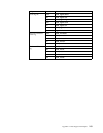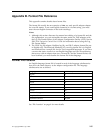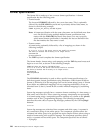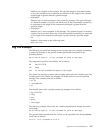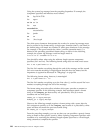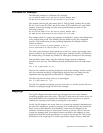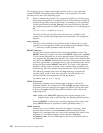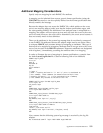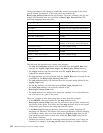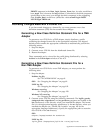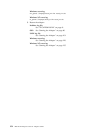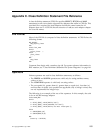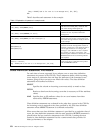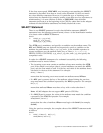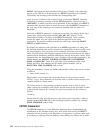Additional Mapping Considerations
Specify only one mapping for each BAROC file attribute.
A mapping can be inherited from a more generic format specification (using the
FOLLOWS keyword) or can be explicitly defined on the format specification that
directly matches the message.
Because the adapter does not access the BAROC file, which resides on the event
server, care must be taken to make sure that the format specifications agree with
the corresponding BAROC file definitions. If an attribute name is misspelled in a
mapping, the adapter will not report an error and will send the event to the event
server as usual; however, the event will be discarded by the event server because it
does not exactly match a class definition.
There can be attributes in the system log message that do not directly correspond
to any BAROC file attributes because the adapter might need to use these values
to compose PRINTF style constant strings for assigning to attributes. This type of
data needs to be assigned to temporary attributes that do not get sent to the event
server, but are used in the PRINTF statement. Temporary attributes are designated
with a hyphen (-) immediately preceding the attribute name in a mapping.
In order to illustrate the use of mappings in format specifications, a sample from
the default tecad_logfile.fmt file is shown following with a few additions.
FORMAT Logfile_Base
%t %s %s*
date $1
hostname $2
msg $3
origin DEFAULT
END
/* login */
// NOTE -- anything enclosed in ’/*’ and ’*/’ pairs is considered to
// be a comment. These comments can extend across multiple lines.
// Anything following a ’//’ is also considered to be a comment;
// this comment only extends to the end of the line.
FORMAT Logfile_Login FOLLOWS Logfile_Base
%t %s login: %s*
sub_source login
END
FORMAT Root_Login FOLLOWS Logfile_Login
%t %s login: ROOT LOGIN %s*
END
FORMAT Root_Login_Success FOLLOWS Root_Login
%t %s login: ROOT LOGIN %s
on_tty $3
msg PRINTF("root login %s", on_tty)
END
FORMAT Root_Login_Success_From FOLLOWS Root_Login_Success
%t %s login: ROOT LOGIN %s FROM %s
from_host $4
-extra ", with extra stuff!"
msg PRINTF("root login from %s%s", from_host, extra)
END
Now, assume that the following system log message is received by the log file
adapter:
Dec 10 09:45:06 sawmill login: ROOT LOGIN ttyp6 FROM oak
Appendix B. Format File Reference 151



